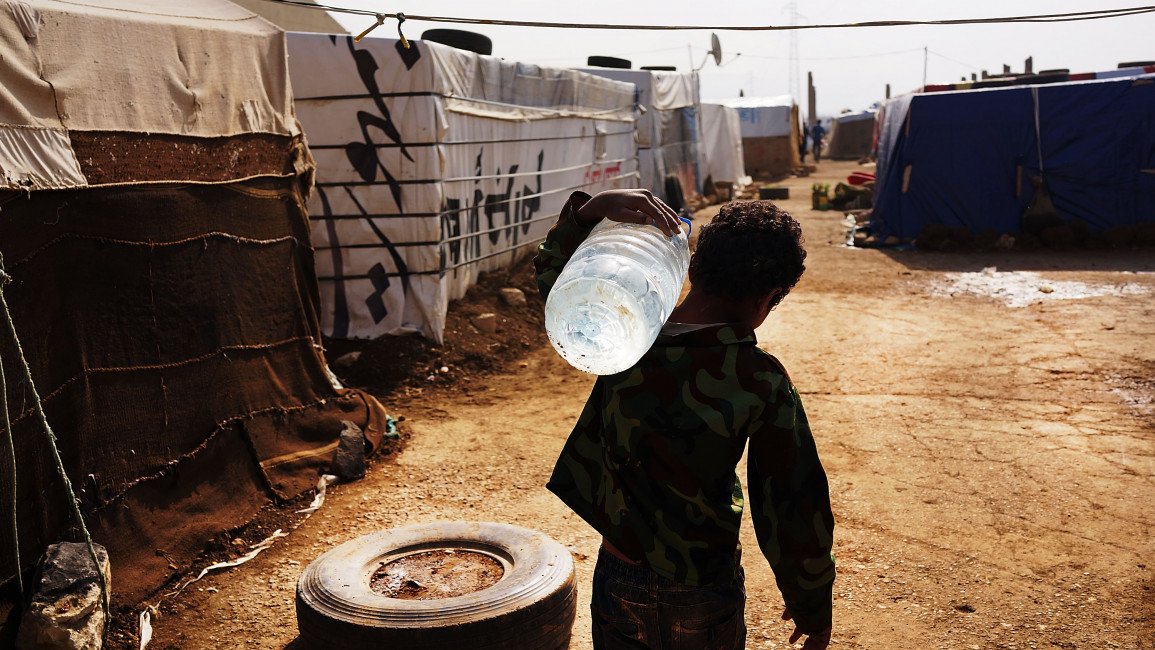
In Lebanon, Syrian refugees face a wave of deportations

A recent wave of deportations has compounded the uncertainties that Syrian refugees in Lebanon have long faced.
Lebanon hosts around two million Syrians, most of whom fled the Syrian civil war which started in 2011.
In April, at least 200 Syrians were deported in violation of the principle of non-refoulment after a series of army raids across the country.
The military also set up checkpoints to review the documents of non-Lebanese citizens, in some cases deporting Syrians without legal residency.
"In April, at least 200 Syrians were deported in violation of the principle of non-refoulment after a series of army raids across the country"
Human rights groups, including Amnesty International, have demanded that all illicit deportations be halted immediately.
Syrians deported back to the war-ravaged country have reported being subject to abuse by regime authorities, including torture, arbitrary arrest, and sexual violence.
“We are extremely concerned by emerging reports on the Lebanese Armed Forces’ summary deportation of dozens of Syrians back to Syria without the chance to challenge their deportation,” Ramzi Kaiss, a researcher on Lebanon and the MENA region, told The New Arab.
“Human Rights Watch has previously found that refugees who returned to Syria between 2017 and 2021 faced grave human rights abuses, including torture.”
Lebanon has long pushed for Syrians to return home and has initiated several repatriation efforts described by authorities as “voluntary”.
But the recent wave of deportations comes at a time when the Arab world is reconciling with the Syrian regime. Simultaneously, Lebanon is going through an economic crisis that has destroyed what remained of the middle class before 2019.
“It is extremely alarming to see the army deciding the fate of refugees, without respecting due process or allowing those facing deportation to challenge their removal in court or seek protection,” Aya Majzoub, Amnesty International’s Deputy Director for the Middle East and North Africa (MENA), said in a statement.
“No refugee should be sent back to a place where their life will be at risk.”
|
|
Anti-refugee rhetoric
Xenophobia in Lebanon towards Syrians is not new, but it has been re-energised by the region’s normalisation with Damascus and Lebanon’s economic collapse.
Some in Lebanon now question the logic of continuing to host Syrians when the war, from their point of view, is ‘winding down’, with calls for the mass return of Syrians.
On Sunday, former president and Free Patriotic Movement (FPM) founder Michel Aoun said that the continued presence of Syrian refugees was a “conspiracy against Lebanon”, describing them as “security refugees and not political refugees”.
"It is extremely alarming to see the army deciding the fate of refugees, without respecting due process or allowing those facing deportation to challenge their removal in court or seek protection"
A federation of trade unions, meanwhile, recently declared a “National Campaign to Liberate Lebanon from the Syrian Demographic Occupation”, reflecting the increasingly aggressive rhetoric directed towards refugees.
In recent years, Lebanese politicians have repeatedly blamed Syrian refugees for Lebanon’s economic crisis, saying they are a burden on the country’s limited resources and should be repatriated.
However, this view has been challenged by some, who firmly put the onus of responsibility on the state for the country’s economic crisis.
“Firstly, the problem is the state’s mismanagement from day one of the crisis. Back then opposing forces within the authorities and the government were promoting their own agendas without any care for the consequences on the Lebanese situation,” members of the 'Change' bloc from the Social Democratic Party-LNA told The New Arab.
Michel Helou, Secretary-General of the Lebanese National Bloc, also says that while he recognises that the country’s difficult situation has raised tensions, refugees should not be scapegoated.
“There is a huge responsibility on the Lebanese state as well as obviously the Syrian state for not dealing with this crisis as they should have. What matters today is to stay away from populist slogans, and simultaneously act swiftly and efficiently to start dealing with this crisis,” Helou told TNA.
|
|
Amid the normalisation of ties with the Assad regime, the issue of repatriation has been on the agenda of regional talks.
Turkey, Syria, and Jordan have taken in the vast majority of Syria’s six million refugees, with each country now seeking ways to repatriate them.
“The success of this effort at repatriation hinges on two factors: jobs and security. With Assad remaining in power, those Syrians who fled for political reasons will refuse to return,” American academic and Middle East historian Joshua Landis told The New Arab.
“But those Syrians, who fled because of the chaos of war, loss of their livelihoods, and inability to feed their families, may consider returning home if there are jobs,” he added.
"The success of this effort at repatriation hinges on two factors: jobs and security. With Assad remaining in power, those Syrians who fled for political reasons will refuse to return"
Landis says that one of the main diplomatic motivations for Syria’s neighbours to normalise ties with Assad, in defiance of US and EU policy, is the issue of refugees.
“They understand that to hasten the return of refugees, the Syrian economy must be jump-started and pulled out of its deep paralysis.”
While refugees will likely not permanently remain in their host countries, around 70% say that they do not intend to return to Syria in the next five years, highlighting the ongoing dangers in their home country.
But amid an economic decline in Lebanon and anti-refugee government policies in other regional countries, Syrians who remain continue to face increasing hostility.
Adnan Nasser is a foreign policy analyst and journalist with a focus on Middle East politics and relations.
Follow him on Twitter: @Adnansoutlook29




